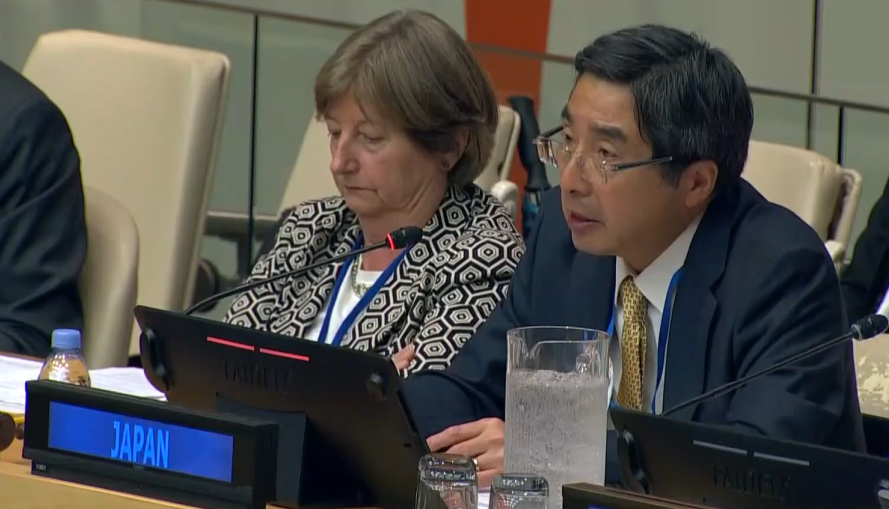Statement by H.E. Ambassador ISHIKANE Kimihiro, Permanent Representative of Japan to the United Nations, at the United Nations Security Council Arria Formula Meeting “25th Anniversary of the Rome Statute: The Contribution of the International Criminal Court to the Maintenance of International Peace and Security”
2023/7/18

(As delivered)
Over the past 25 years, the International Criminal Court (ICC), as the only permanent international court for the most serious crimes committed by individuals, has played a significant role in our fight against impunity. It holds accountable those responsible for their crimes and prevents these crimes from happening, thereby contributing to the maintenance of international peace and security.
The principle of complementarity and cooperation are two important pillars. We see both opportunities and challenges here. States Parties have the primary responsibility to prosecute the most serious crimes. The ICC may only exercise jurisdiction where the concerned States are unwilling or unable to do so. Even in the cases where the Court exercises jurisdiction, it cannot fulfill its mandate alone, and cooperation from States is critical. The challenges we are facing in the two Security Council referral cases – Libya and Sudan – corroborate the importance of States’ cooperation. We welcome the Court’s active engagement with States through capacity building with the aim to strengthen national legal systems.
In any fight against impunity, the clock is always ticking. The longer it takes, the more witnesses and pieces of evidence are lost, thereby making it harder for the ICC to conduct a thorough investigation, followed by timely prosecution and a speedy trial. Justice delayed is justice denied – expediting the Court’s work is also a strong demand from victims. To aid and empower victims, we highly appreciate the initiatives taken by the Trust Fund for Victims (TFV) and other important activities by civil society.
Justice under the rule of law is one of the prerequisites for maintaining international peace and security, and the UN Member States, especially Security Council members, should follow up cases of referral to help the ICC fulfill its mandate of addressing the situations in Sudan and Libya. For the Council, it would be worth having a deeper discussion on how the current collaboration between the Council and the ICC can be improved for maintaining international peace and security. Promoting the universality of the Rome Statute is another important agenda for filling gaps in the international criminal justice. We hope today’s discussion contributes to raising people’s awareness on such points.
A quarter of a century after its inception, the current situation in the world is demonstrating the importance of the ICC more than ever. Japan renews its full support to the Court’s activities. We reiterate our commitment to defend the principles and values enshrined in the Rome Statute, and to preserve the ICC’s integrity undeterred by any threats against the Court, its officials and personnel, as well as those cooperating with it.
I thank you.
The principle of complementarity and cooperation are two important pillars. We see both opportunities and challenges here. States Parties have the primary responsibility to prosecute the most serious crimes. The ICC may only exercise jurisdiction where the concerned States are unwilling or unable to do so. Even in the cases where the Court exercises jurisdiction, it cannot fulfill its mandate alone, and cooperation from States is critical. The challenges we are facing in the two Security Council referral cases – Libya and Sudan – corroborate the importance of States’ cooperation. We welcome the Court’s active engagement with States through capacity building with the aim to strengthen national legal systems.
In any fight against impunity, the clock is always ticking. The longer it takes, the more witnesses and pieces of evidence are lost, thereby making it harder for the ICC to conduct a thorough investigation, followed by timely prosecution and a speedy trial. Justice delayed is justice denied – expediting the Court’s work is also a strong demand from victims. To aid and empower victims, we highly appreciate the initiatives taken by the Trust Fund for Victims (TFV) and other important activities by civil society.
Justice under the rule of law is one of the prerequisites for maintaining international peace and security, and the UN Member States, especially Security Council members, should follow up cases of referral to help the ICC fulfill its mandate of addressing the situations in Sudan and Libya. For the Council, it would be worth having a deeper discussion on how the current collaboration between the Council and the ICC can be improved for maintaining international peace and security. Promoting the universality of the Rome Statute is another important agenda for filling gaps in the international criminal justice. We hope today’s discussion contributes to raising people’s awareness on such points.
A quarter of a century after its inception, the current situation in the world is demonstrating the importance of the ICC more than ever. Japan renews its full support to the Court’s activities. We reiterate our commitment to defend the principles and values enshrined in the Rome Statute, and to preserve the ICC’s integrity undeterred by any threats against the Court, its officials and personnel, as well as those cooperating with it.
I thank you.
